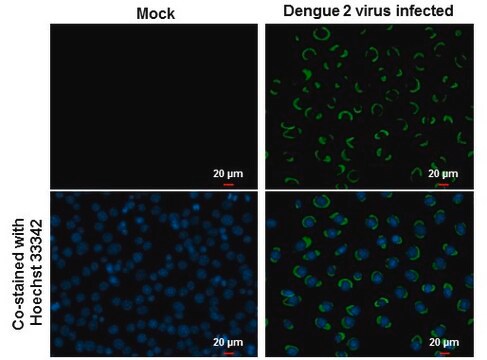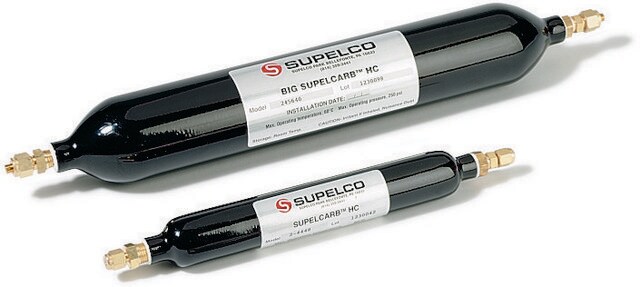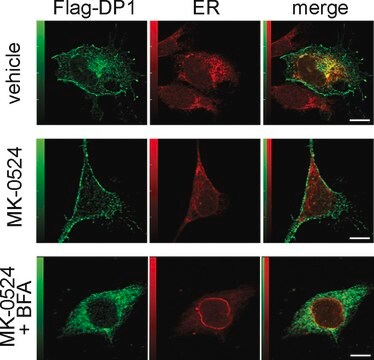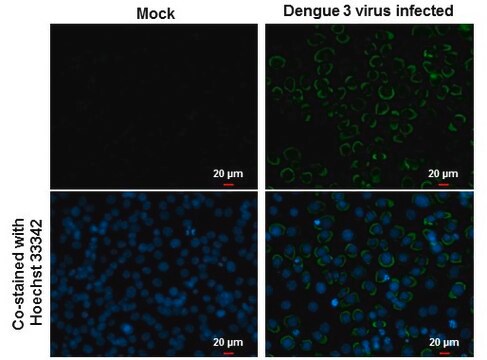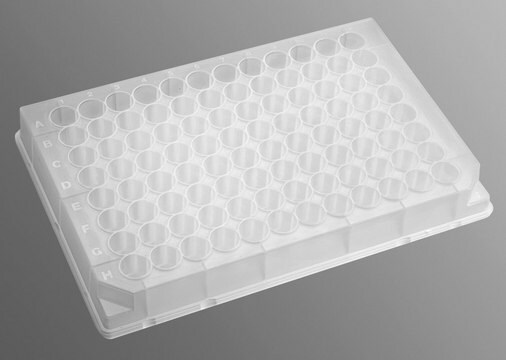推荐产品
生物源
mouse
品質等級
抗體表格
purified immunoglobulin
無性繁殖
3H5-1, monoclonal
物種活性
human
製造商/商標名
Chemicon®
技術
immunofluorescence: suitable
inhibition assay: suitable (hemagglutination)
同型
IgG1
運輸包裝
wet ice
一般說明
登革热是蚊子传播的急性病毒性疾病,特征为发热、头痛、关节痛(严重的眶后疼痛)、肌痛、皮疹、恶心和呕吐。 感染由四种密切相关但抗原不同的病毒血清型(DEN-1、DEN-2、DEN-3 和 DEN-4)之一引起。 感染其中一种血清型不会产生交叉保护性免疫,因此生活在登革热流行地区的人一生中最多可感染四次登革热。登革热主要是热带地区的城市疾病,引起登革热的病毒在人类和埃及伊蚊(一种家栖型日间叮咬的蚊子,偏爱叮咬人类)之间循环传播。虽然大多数登革热感染导致的疾病相对较轻,但有些感染会引起登革出血热(DHF)或登革热休克综合症,儿童尤其易受感染。 登革热自1779 年以来不断有疫情爆发的报道,发病率一直在上升,过去 15 年中,全球范围内的多血清型登革热大流行愈演愈烈。 目前还没有针对登革热的特效抗病毒疗法,但对于典型登革热和登革出血热,对症和支持性措施都很有效。登革热的重要风险因素包括所涉及的病毒株和血清型,以及患者的年龄、免疫状况和遗传倾向。
特異性
与2型登革热病毒发生反应。
免疫原
登革热2型抗原(新几内亚C型)。
應用
抗登革热病毒II型抗体,克隆号3H5-1,经验证可用于HI、IF中登革热病毒II型的检测。
推荐用于免疫荧光分析。 也适用于血凝抑制试验和斑块减少试验。
IFA: 1:200-1:400。
用pH 7.5-8.0的缓冲液稀释至所需工作体积。 对于广泛稀释,应使用含蛋白质或其他稳定介质。
最终工作稀释度必须由最终使用者进行确定。
IFA: 1:200-1:400。
用pH 7.5-8.0的缓冲液稀释至所需工作体积。 对于广泛稀释,应使用含蛋白质或其他稳定介质。
最终工作稀释度必须由最终使用者进行确定。
研究子类别
传染病 - 病毒
传染病 - 病毒
研究类别
传染病
传染病
外觀
形式:纯化
蛋白G纯化
蛋白G纯化免疫球蛋白。 液体形式,溶于0.02 M PB、0.25 M NaCl,pH = 7.6,含0.1%叠氮化钠作为防腐剂
儲存和穩定性
自收到之日起,将未稀释的分装样品2°C to 8°C储存,最多可保存12个月。
分析報告
对照
登革热病毒阳性患者样品
登革热病毒阳性患者样品
其他說明
浓度:请参考批次特异性浓缩物的检验报告。
法律資訊
CHEMICON is a registered trademark of Merck KGaA, Darmstadt, Germany
免責聲明
除非我们的产品目录或产品附带的其他公司文档另有说明,否则我们的产品仅供研究使用,不得用于任何其他目的,包括但不限于未经授权的商业用途、体外诊断用途、离体或体内治疗用途或任何类型的消费或应用于人类或动物。
儲存類別代碼
10 - Combustible liquids
水污染物質分類(WGK)
WGK 2
閃點(°F)
Not applicable
閃點(°C)
Not applicable
Characterization of the early events in dengue virus cell entry by biochemical assays and single-virus tracking.
van der Schaar, HM; Rust, MJ; Waarts, BL; van der Ende-Metselaar, H; Kuhn, RJ; Wilschut et al.
Journal of virology null
Leticia Franco et al.
PLoS neglected tropical diseases, 5(8), e1251-e1251 (2011-08-11)
Dengue virus (DENV) circulates in human and sylvatic cycles. Sylvatic strains are both ecologically and evolutionarily distinct from endemic viruses. Although sylvatic dengue cycles occur in West African countries and Malaysia, only a few cases of mild human disease caused
Hilde M van der Schaar et al.
PLoS pathogens, 4(12), e1000244-e1000244 (2008-12-20)
Dengue virus (DENV) is an enveloped RNA virus that causes the most common arthropod-borne infection worldwide. The mechanism by which DENV infects the host cell remains unclear. In this work, we used live-cell imaging and single-virus tracking to investigate the
Tine De Burghgraeve et al.
PloS one, 7(5), e37244-e37244 (2012-05-25)
There is an urgent need for potent inhibitors of dengue virus (DENV) replication for the treatment and/or prophylaxis of infections with this virus. We here report on an aglycon analogue of the antibiotic teicoplanin (code name LCTA-949) that inhibits DENV-induced
Zhi-Shan Zhang et al.
Molecular medicine reports, 11(2), 1009-1016 (2014-11-06)
There is currently no effective vaccine to prevent dengue infection, despite the existence of multiple studies on potential methods of immunization. The aim of the present study was to explore the effect of DNA and/or recombinant protein on levels of
我们的科学家团队拥有各种研究领域经验,包括生命科学、材料科学、化学合成、色谱、分析及许多其他领域.
联系技术服务部门